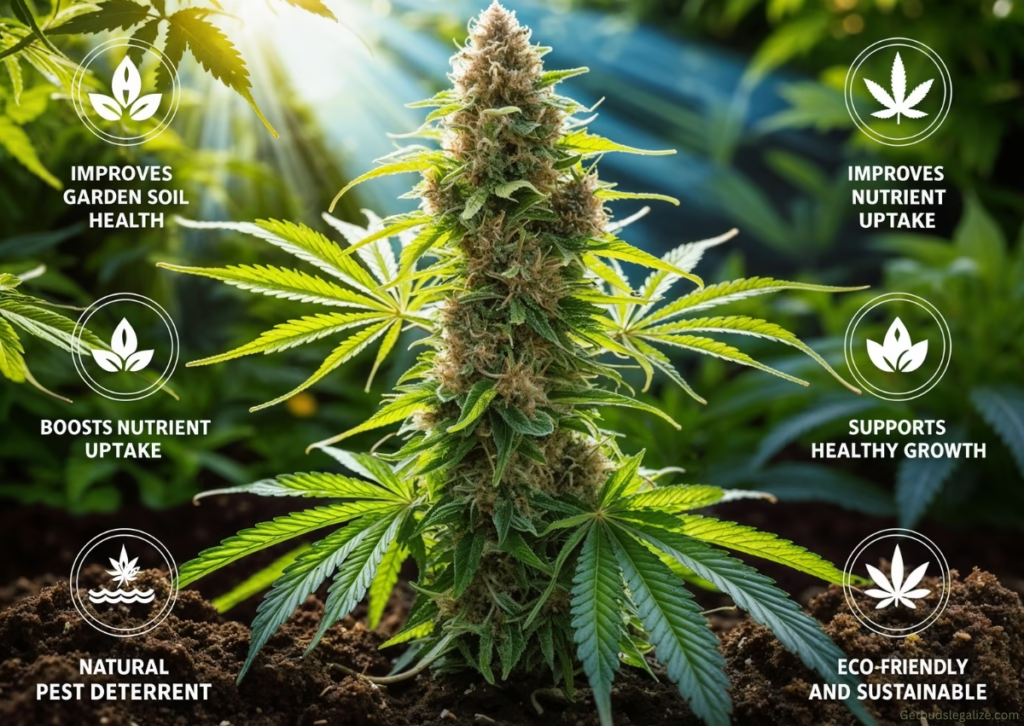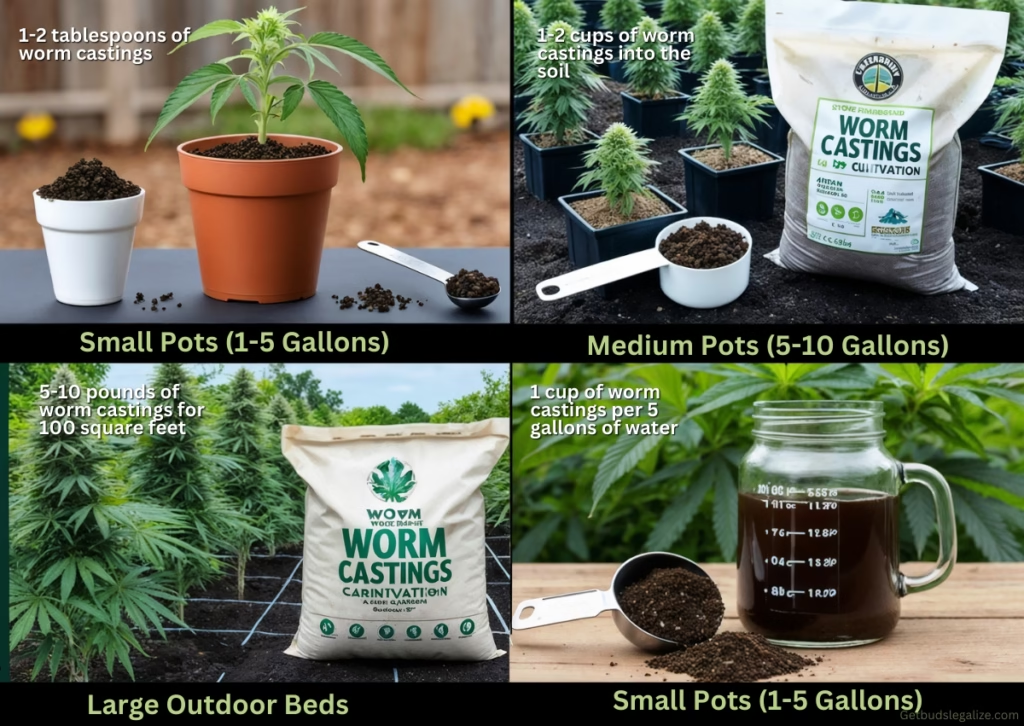How to Use Worm Casting in Your Garden for Healthy Cannabis Growth



How to Use Worm Casting in Your Garden: A Natural Boost for Cannabis Plants
Did you know that the secret to lush cannabis plants might be crawling in your soil? When it comes to organic gardening, worm castings are one of nature's best-kept secrets. Known as "black gold" among growers, these nutrient-rich droppings from earthworms are packed with essential nutrients and beneficial microbes that can supercharge your cannabis garden.
Whether you're growing indoors, outdoors, or using hydroponics, worm castings provide an eco-friendly way to boost plant health, improve soil quality, and enhance yields.
In this comprehensive guide, we’ll cover everything you need to know about using earthworm castings in your cannabis garden, including their benefits, application methods, and tips for maximizing results.
Why Earthworm Castings Are Black Gold for Cannabis
Wormcastings, often called vermicompost, are the excreted waste of earthworms. As worms consume organic matter, they break it down into a nutrient-dense material that is rich in:
- Nitrogen (N): Promotes lush, green foliage and supports vigorous vegetative growth.- Phosphorus (P): Essential for root development and flowering.
- Potassium (K): Enhances overall plant health, disease resistance, and growth.
- Micronutrients: Contains trace elements like calcium, magnesium, and iron.
- Beneficial Microorganisms: Improves nutrient absorption and boosts soil microbial activity.
These natural fertilizers are pH-neutral, non-toxic, and gentle on plants, making them ideal for cannabis cultivation.



Top 5 Benefits of Worm Castings for Cannabis Plants
Using worm castings in your cannabis garden offers several advantages:
- Improves Garden Soil Health: Enriches the soil with organic matter, enhancing aeration, water retention, and structure.- Boosts Nutrient Uptake: The microorganisms in worm castings break down nutrients into forms that cannabis plants can easily absorb.
- Supports Healthy Growth: A balanced nutrient profile supports robust vegetative growth and flowering, leading to higher yields.
- Natural Pest Deterrent: Contains chitinase, an enzyme that helps plants ward off pests like spider mites and aphids.
- Eco-Friendly and Sustainable: As a renewable resource, worm castings offer an environmentally friendly alternative to chemical fertilizers.
- How to Apply: Blend 10-20% wormcastings with your potting soil or growing medium.
- When to Use: At the start of your grow cycle when preparing your grow medium.
- Benefits: Creates a nutrient-rich foundation for healthy root development and plant growth.
- How to Apply: Spread a thin layer of wormcastings (about ½ inch thick) around the base of your cannabis plants.
- When to Use: During the vegetative and flowering stages.
- Benefits: Provides a slow-release nutrient source and improves soil microbial activity.
- Mix 1 cup of wormcastings and 1-2 tablespoons of unsulfured molasses into 5 gallons of water.
- Aerate the mixture for 24-48 hours using an air pump.
- Once aerated, strain the liquid and use it to water your plants or apply it as a foliar spray.
- How to Apply: Use wormcasting tea as a nutrient supplement in hydroponic systems.
- When to Use: During vegetative and flowering stages.
- Benefits: Provides an organic nutrient boost without clogging hydroponic equipment.



How Much Worm Castings Should You Use?
Finding the right amount of worm castings depends on your garden size and growing method:
- Small Pots (1-5 Gallons): Add 1-2 tablespoons per gallon of soil.- Medium Pots (5-10 Gallons): Mix 1-2 cups of worm castings into the soil.
- Large Outdoor Beds: Incorporate 5-10 pounds of worm castings per 100 square feet of garden area.
- Compost Tea: Use 1 cup of worm castings per 5 gallons of water.
- Combine With Other Amendments: Pair worm castings with organic fertilizers like bat guano or kelp meal for a balanced nutrient profile.
- Store Properly: Keep worm castings in a cool, dark place to preserve microbial activity.
- Avoid Overuse: Although gentle, excessive worm castings can lead to water retention issues in the soil.
- Monitor Plant Health: Adjust application rates based on your plants' response.
Worm Castings vs Chemical Fertilizers: Which Is Better?
Chemical fertilizers can provide a quick nutrient boost to plants, but they often come with a downside: they can deplete soil health over time. Continuous use of synthetic fertilizers can lead to nutrient imbalances, reduced microbial activity, and long-term damage to the soil structure.
On the other hand, wormcastings offer a more sustainable, long-term solution. They not only provide essential nutrients but also enhance soil structure, improve microbial life, and promote healthy, organic cannabis cultivation.
By enriching the soil and supporting beneficial microorganisms, wormcastings help build a thriving, resilient garden ecosystem.
Elevate Your Cannabis Garden Naturally With Worm Castings
Wormcastings are a versatile, eco-friendly addition to any cannabis garden. By incorporating them into your growing routine, you can enhance soil health, boost nutrient uptake, and achieve healthier, more productive plants. Whether you’re a seasoned grower or new to cannabis cultivation, worm castings offer a natural way to elevate your results.
Ready to try worm castings in your cannabis garden? Share your experiences and tips, join our community for more organic growing insights, or follow us on Facebook for the latest updates!


Frequently Asked Questions (FAQs) About How to Use Worm Casting in Your Garden for Plants
What Are Worm Castings?
Worm-castings, also known as vermicompost, are nutrient-dense waste produced by earthworms. This natural byproduct serves as a powerful organic fertilizer, enriching the soil and promoting healthy plant growth in your cannabis garden.
How Do Worm Castings Benefit Cannabis Plants?
Worm-castings are packed with essential nutrients like nitrogen, phosphorus, and potassium. They improve soil structure, increase water retention, and encourage the growth of beneficial microbes. These factors combined lead to healthier cannabis plants with stronger root systems and better overall growth
Can I Use Worm Castings for All Growth Stages of Cannabis?
Yes, worm-castings are ideal for every stage of cannabis growth. During the seedling phase, they aid in root development. In the vegetative stage, they support lush foliage, and during flowering, they enhance nutrient uptake for bigger and more potent buds.
How Much Worm Castings Should I Use?
- Seedlings: Mix 10-20% worm-castings with your potting soil for a nutrient boost.
- Vegetative Stage: Top-dress with 1-2 inches of worm-castings every 3-4 weeks to provide consistent nourishment.
- Flowering Stage: Apply a thin layer of worm-castings around the base of your plants or brew worm-casting tea for nutrient-rich feeding.
What Is Worm Casting Tea and How Do I Make It?
Worm tea is a liquid fertilizer created by steeping worm castings in water. To make it, follow these steps:
Ingredients:
- 1 cup of worm-castings- 1 gallon of dechlorinated or filtered water
- 1 tablespoon unsulfured molasses
- Aquarium pump or air stone (optional)
- Fine mesh or cheesecloth for straining
- Prepare the Water: Use dechlorinated water or let tap water sit for 24 hours to remove chlorine.
- Combine: Add 1 cup of wormcastings and 1 tablespoon molasses to 1 gallon of water.
- Aerate: Use a pump or air stone for 24-48 hours to activate microbes. Stir several times if no pump is available.
- Strain: After aerating, strain the tea to remove solids.
- Soil Drench: Water plants at the base.
- Foliar Spray: Spray leaves and flowers for quick absorption.
This enriched tea boosts microbial activity, enhancing nutrient availability for your plants.
How to Make Worm Casting Tea for Flowering?
To promote strong flowering, make a nutrient-rich worm-casting tea:
Ingredients:
- 2 cups wormcastings- 1 tbsp high-phosphorus bat guano
- 1 gallon water
- 1-2 tbsp unsulfured molasses (optional)
- Use dechlorinated or filtered water.
- Mix wormcastings, bat guano, and molasses in water.
- Aerate for 24-48 hours using a pump or manually stir.
- Strain the tea.
- Apply as a soil drench or foliar spray to enhance flower production.
Can Worm Castings Replace Other Fertilizers?
While wormcastings are a fantastic natural fertilizer, they may not entirely replace other nutrient sources, especially for cannabis, which can be a heavy feeder. Consider them a supplement to a well-rounded fertilization plan, enhancing soil health and plant growth.
Are There Any Risks to Using Worm Castings?
Wormcastings are gentle on plants and unlikely to cause nutrient burn, making them safe for all stages of cannabis growth. However, excessive use can cause water retention issues, leading to waterlogged soil. Moderate application is key to preventing any potential problems.
Where can I buy worm castings near me?
You can find high-quality organic wormcastings at local garden centers, online retailers, or directly from worm farms. Make sure to choose a product that is free from chemical additives and contaminants for the best results in your garden.
Can I Make Worm Castings at Home?
Yes! You can create your wormcastings by setting up a vermiculture system at home. Use kitchen scraps, shredded paper, and red wiggler worms to produce nutrient-rich castings over time, providing an ongoing, sustainable source of organic fertilizer.
How Do Worm Castings Compare to Other Organic Fertilizers?
Wormcastings are unique due to their balanced nutrient profile, ease of use, and the fact that they improve soil structure. Unlike some other organic fertilizers, they’re less likely to cause damage from over-application, making them perfect for both beginner and experienced growers.
How Often Should I Apply Worm Castings?
Apply wormcastings every 2-4 weeks during the growing season to provide continuous nourishment. For worm-casting tea, use it every 1-2 weeks to ensure consistent nutrient delivery and promote robust plant health.
How Much Worm Castings Per Gallon of Soil?
For best results, mix 10-20% wormcastings into your soil, depending on the plant’s needs and the soil’s nutrient content. This helps provide a steady release of nutrients without overwhelming the plants.
What Do Worm Castings Look Like?
Wormcastings are dark, crumbly, and earthy-smelling. They have a rich, almost black color, resembling fine soil or compost. High-quality wormcastings are smooth and soft, without large chunks or debris.
What Are the Disadvantages of Worm Castings?
While wormcastings are highly beneficial, there are a few downsides. They can be costly if bought in bulk, and excessive use may lead to waterlogging in poorly-draining soils. It’s important to use them in moderation to avoid these issues.
How to Use Worm Casting in Your Garden with Water?
To use wormcastings with water, brew worm-casting tea as described earlier. This liquid form allows for easy absorption by plant roots and can be applied directly to the soil or used as a foliar spray.
How to Use Worm Casting in Your Garden in Winter?
In winter, wormcastings can still be used, but be mindful of soil temperature. Applying them as a top dressing or in the form of worm-casting tea is ideal for maintaining nutrient availability without disturbing the plant’s roots during cold months.
How to Use Worm Castings in Potted Plants?
For potted plants, mix 10-20% wormcastings into the potting soil.
https://getbudslegalize.com/how-to-use-worm-casting-in-your-garden/
Commenti
Posta un commento